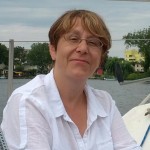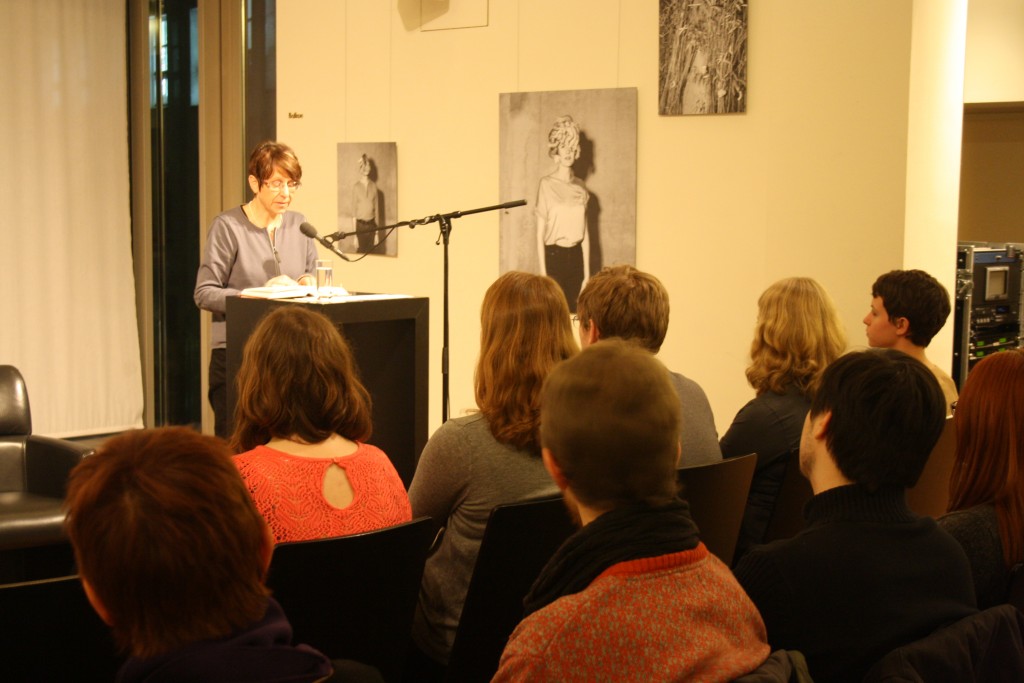
Kerstin Hensel
An advantage of being part of the Dickinson-in-Bremen program is having the opportunity to participate in a variety of cultural events, such as in a private workshop with German author Kerstin Hensel, preceding a reading of one of her books, Lärchenau, later that evening at the theater in Bremen. This workshop provided us with the comfortable environment in which to ask Frau Hensel, who began her writing career in the GDR, many questions concerning literature, culture, and cultural politics behind the Wall, as well as what it meant to be an East German author after Germany’s Reunification. I was interested to learn about how art for the masses was endorsed by the communist government in East Germany, and to learn about the extent in which growing up in the East affected Hensel’s opinions and motivations as a writer. I did not expect to learn that Frau Hensel, despite growing up in the GDR, does not identify herself as an East German writer, but rather as a German writer. It was also interesting to learn that one can differentiate East German from West German writings by recognizing stylistic differences between them. Overall, this workshop allowed me to bring a greater understanding and appreciation of literature to Frau Hensel’s book-reading later that night, and I was thankful to be offered the opportunity to better familiarize myself with the literary culture of East Germany and of the time of German Reunification. >Carol Rynar<
The opportunity to hear a reading from a prominent German author in addition to also participating in a personalized workshop was very exciting. We were able to ask Frau Hensel questions about her background in the DDR and how this has influenced her work today or how she approaches writing novels. This fascinating discussion was very applicable to our theme of Deutsche Einheit and taught me a lot about the foundation of life in East Germany. At the reading, we were treated to segments of her novel Lärchenau and could form parallels between her earlier workshop with us and the story and writing style that we were presented with. This was a really interesting experience to be a part of, and I gained valuable insights into the teachings and thoughts of a modern German author. >Helen Schlimm<
I really enjoyed the workshop wit Kerstin Hensel. I learned a lot about how literature was created and received in the German Democratic Republic. I had no idea that East Germany had such a strong reading culture and how culturally aware the common person was. >Ira Lauer<

Kerstin Hensel reading from her novel “Lärchenau”.
The Kerstin Hensel meeting was informative and interesting. She read an excerpt of one of her books in which she wrote an alternative ending to Hänsel and Gretel. In her version, Hänsel and Gretel accept their captivity and live a secure life with the mean witch. When she finally dies, Hänsel and Gretel are unsure what to do with their freedom and approach the new, unknown world with hesitancy and fear. She wrote this story as a symbol for the people in the DDR, who grew comfortable in their life in the communist east. Overall it was definitely a valuable learning experience, and I really enjoyed listening to a German writer talk about her past and her writing methods. >Phoebe Allebach<
Click HERE to see the flyer of the event.
 Every year, the Carl Schurz Deutsch-Amerikanischer Club hosts a wonderful Thanksgiving Dinner. This year, it took place at the Atlantic Grand Hotel in the city center of Bremen. The red carpet was laid out at its entrance in the Böttcherstraße to welcome the many guests.
Every year, the Carl Schurz Deutsch-Amerikanischer Club hosts a wonderful Thanksgiving Dinner. This year, it took place at the Atlantic Grand Hotel in the city center of Bremen. The red carpet was laid out at its entrance in the Böttcherstraße to welcome the many guests. After the welcome reception, the evening entailed a quiz, musical acts, and of course an amazing Thanksgiving dinner buffet that was accompanied by live piano music. What a wonderful way of starting into the holiday season!
After the welcome reception, the evening entailed a quiz, musical acts, and of course an amazing Thanksgiving dinner buffet that was accompanied by live piano music. What a wonderful way of starting into the holiday season! All photos are courtesy of the Carl Schurz Deutsch-Amerikanischer Club and were taken by Raju Gurung. For additional photos, please follow the link to the Thanksgiving Dinner 2015 photo album on the Facebook page of the CSDAC HERE.
All photos are courtesy of the Carl Schurz Deutsch-Amerikanischer Club and were taken by Raju Gurung. For additional photos, please follow the link to the Thanksgiving Dinner 2015 photo album on the Facebook page of the CSDAC HERE.


